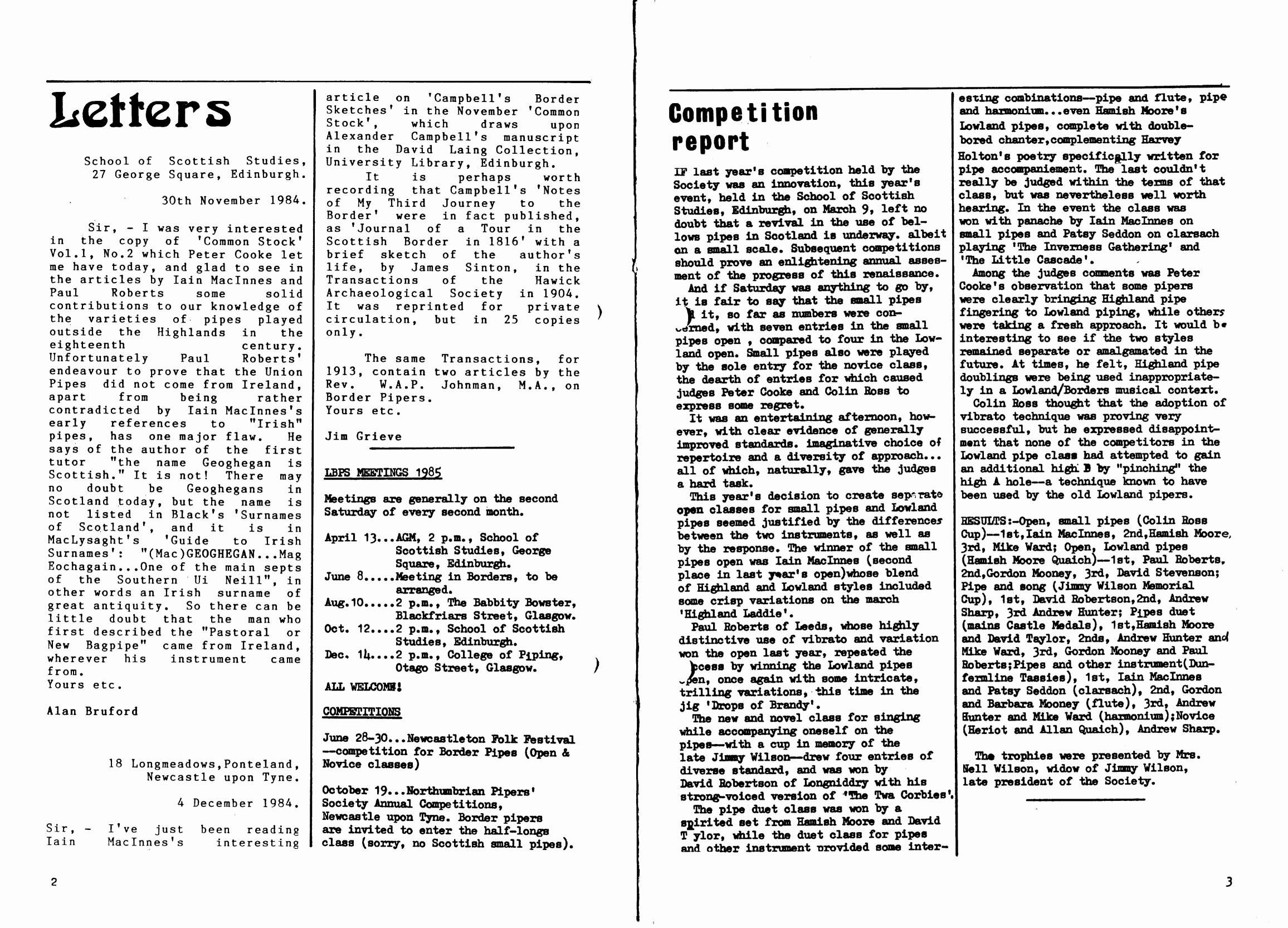LBPS Competition 1985
If last year's competition held by the Society was an innovation, this year'sevent, held in the School of Scottish Studies, Edinburgh, on March 9, left no doubt that a revival in the use of bellows pipes in Scotland is underway, albeit on a small scale. Subsequent competitions should prove an enlightening annual assessment of the progress of this renaissance. And if Saturday was anything to go by, it is fair to say that the small pipes had it, so far as numbers were concerned, with seven entries in the small pipes open, compared to four in the Lowland open. Small pipes also were played by the sole entry for the novice class, the dearth of entries for which caused judges Peter Cooke and Colin Ross to express some regret. It was an entertaining afternoon, how ever, with clear evidence of generally improved standards. imaginative choice of repertoire and a diversity of approach... all of which, naturally, gave the judges a hard task.
This year's decision to create separate open classes for small pipes and Lowland pipes seemed justified by the differences between the two instruments, as well as by the response. The winner of the small pipes open was Iain MacInnes (second place in last year's open), whose blend of Highland and Lowland styles included some crisp variations on the ‘Highland Laddie'. Paul Roberts of Leeds, whose highly distinctive use of vibrato and variation won the open last year, repeated the process by winning the Lowland pipes open, once again with some intricate, trilling variations, this time in the jig ‘Drops of Brandy’.
The new and novel class for singing while accompanying oneself on the pipes—-with a cup in memory of the late Jinmy Wilson—-drew four entries of diverse standard, and was won by David Robertson of Longniddry with his strong-voiced version of *The Twa Corbies', The pipe duet class was won by a spirited set from Hamish Moore and David Taylor, while the duet class for pipes and other instrument provided some interesting combinations, pipe and flute, pipe and armonium...even Hamish Moore's Lowland pipes, complete with double-bored chanter, complementing Harvey Holton's poetry specifically written for pipe accompaniment. The last couldn't really be judged within the terms of that class, but was nevertheless well worth hearing. In the event the class was won with panache by Iain MacInnes on small pipes and Patsy Seddon on clarsach playing 'The Inverness Gathering’ and 'The Little Cascade'. Among the judges comments was Peter Cooke's observation that some pipers were clearly bringing Highland pipe fingering to Lowland piping, while others were taking a fresh approach. It would be interesting to see if the two styles remained separate or amalgamated in the future. At times, he felt, Highland pipe doublings were being used inappropriately in a Lowland/Borders musical context. Colin Ross thought that the adoption of vibrato technique was proving very successful, but he expressed disappointment that none of the competitors in the Lowland pipe class had attempted to gain an additional high B by "pinching" the high A hole-- a technique known to have been used by the old Lowland pipers.
RESULTS :-
Open, small pipes (Colin Ross Cup)—-
1st,Iain MacInnes,
2nd,Hamish Moore,
3rd, Mike Ward;
Open, Lowland pipes
(Hamish Moore Quaich}—
1st, Paul Roberts,
2nd,Gordon Mooney,
3rd, David Stevenson;
Pipe and song (Jimmy Wilson Memorial Cup),
1st, David Robertson,
2nd, Andrew Sharp,
3rd Andrew Hunter;
Pipes duet (Mains Castle Medals),
1st,Hamish Moore and David Taylor,
2nd, Andrew Hunter and Mike Ward,
3rd, Gordon Mooney and Paul Roberts;
Pipes and other instrument (Dunfermline Tassies),
1st, Iain MacInnes and Patsy Seddon (clarsach),
2nd, Gordon and Barbara Mooney (flute),
3rd, Andrew Hunter and Mike Ward (harmonium) ;
Novice (Heriot and Allan Quaich), Andrew Sharp,
The trophies were presented by Mrs.Nell Wilson, widow of Jimmy Wilson, late president of the Society.

